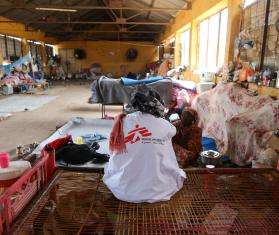NEW YORK/BRUSSELS, October 25, 2019—Shelling yesterday on the village of Janoudia in Idlib governorate, northwestern Syria, wounded 17 people who were rushed to a nearby hospital that Doctors Without Borders/Médecins Sans Frontières (MSF) supports, highlighting how the conflict in northwestern Syria continues to cause fear, displacement, and acute medical needs.
Three of the patients died before arrival at the hospital, and one patient died a few moments after arrival. Six other patients were in critical condition but were stabilized and treated or referred to other hospitals, including two children with severe head injuries. Three had moderate wounds and four had light injuries, including one child.
"When the injured started arriving at 5 p.m. yesterday, we requested all of our staff to come to the hospital so that we would be able to respond," the doctor managing the hospital told MSF. "The medical team was fully deployed, but we had to refer one case to another hospital because all our operating theaters and medics were occupied and the case couldn't wait. This patient had a double trauma in the head and in the chest. We stayed up all night to treat the injured as best we could."
The need for medical services in northwestern Syria is extremely high. Beyond the direct victims of aerial bombing and shelling, more than one million people have fled areas of fighting, many of whom lack basic necessities and are extremely reliant on external assistance for food, shelter, water and medical care.
MSF teams across northwestern Syria currently provide primary health care, maternal health care, vaccinations, and treatment for non-communicable diseases through mobile clinics. MSF teams also distribute relief items and improve water and sanitation systems and support regular vaccination activities in multiple health facilities.
In the past month, MSF sent a mobile clinic team to provide primary health care and vaccinations to families in makeshift camps in the cold, mountainous terrain where many of the displaced people in northwestern Syria have fled.
MSF continues to run a health facility in northwestern Syria specialized in burn care. MSF supports three hospitals in the region, including the hospital responding to yesterday's mass casualty influx, and provides support at a distance for primary and secondary health care in and around Idlib and Aleppo.
In northeastern Syria, MSF has reduced or suspended its medical programs across Raqqa and Al Hassakeh governorates since October 15, as MSF has been unable to ensure the safety of its teams due to the conflict in these areas.
To ensure independence from political pressures, MSF receives no government funding for its work in Syria.




